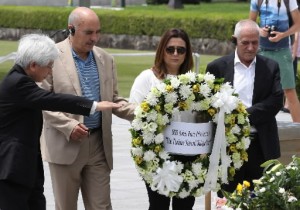Three Tunisians, winners of Nobel Peace Prize, visit Hiroshima Peace Memorial Park
Jul. 23, 2016
by Gosuke Nagahisa, Staff Writer
On July 22, representatives from three civil organizations in Tunisia, winners of last year’s Nobel Peace Prize, visited the Peace Memorial Park in Hiroshima for the first time. Called the “Tunisian National Dialogue Quartet,” the organizations contributed to the democratization of Tunisia. The three learned about the destruction wrought by the atomic bombing and appealed for the realization of world peace through non-violence.
The three representatives are Hassine Abassi, the secretary general of the Tunisian General Labor Union; Ouided Bouchamaoui, the president of the Tunisian Confederation of Industry, Trade and Handicrafts; and Abdessattar Benmoussa, the president of the Tunisian Human Rights League. They arrived in Japan on July 17 at the invitation of the Sasagawa Peace Foundation, located in Tokyo, to give lectures and engage in other activities. They traveled to Hiroshima on July 22.
The visitors from Tunisia toured the Peace Memorial Museum guided by Kenji Shiga, the director of the museum. They studied a panoramic model of the city center in the aftermath of the A-bomb blast and paper cranes that were folded by Sadako Sasaki, a girl who died of A-bomb-induced leukemia. Next, they went to the Cenotaph for the Atomic Bomb Victims and offered wreathes of flowers. They also read some passages from the Koran and prayed. In addition, the visitors listened to Keiko Ogura, 78, an A-bomb survivor and resident of Naka Ward, recount her experience at the International Conference Center Hiroshima.
Speaking to reporters, Mr. Abassi said that we must not only know what happened in Hiroshima but we must also do whatever we can so that this tragedy will not be repeated. Ms. Bouchamaoui said that such destruction must never again occur, and Mr. Benmoussa said that violence can never solve anything, no matter the reason.
The Tunisian National Dialogue Quartet was formed in 2013 with these three organizations and the Tunisian Order of Lawyers. The group contributed to the realization of a new Constitution and a democratic presidential election in the midst of growing tensions between the nation’s Islamic parties and secular parties in the wake of the collapse, in 2011, of Tunisia’s dictatorship. The representative from the Tunisian Order of Lawyers was unable to visit Japan because of poor health.
(Originally published on July 23, 2016)
On July 22, representatives from three civil organizations in Tunisia, winners of last year’s Nobel Peace Prize, visited the Peace Memorial Park in Hiroshima for the first time. Called the “Tunisian National Dialogue Quartet,” the organizations contributed to the democratization of Tunisia. The three learned about the destruction wrought by the atomic bombing and appealed for the realization of world peace through non-violence.
The three representatives are Hassine Abassi, the secretary general of the Tunisian General Labor Union; Ouided Bouchamaoui, the president of the Tunisian Confederation of Industry, Trade and Handicrafts; and Abdessattar Benmoussa, the president of the Tunisian Human Rights League. They arrived in Japan on July 17 at the invitation of the Sasagawa Peace Foundation, located in Tokyo, to give lectures and engage in other activities. They traveled to Hiroshima on July 22.
The visitors from Tunisia toured the Peace Memorial Museum guided by Kenji Shiga, the director of the museum. They studied a panoramic model of the city center in the aftermath of the A-bomb blast and paper cranes that were folded by Sadako Sasaki, a girl who died of A-bomb-induced leukemia. Next, they went to the Cenotaph for the Atomic Bomb Victims and offered wreathes of flowers. They also read some passages from the Koran and prayed. In addition, the visitors listened to Keiko Ogura, 78, an A-bomb survivor and resident of Naka Ward, recount her experience at the International Conference Center Hiroshima.
Speaking to reporters, Mr. Abassi said that we must not only know what happened in Hiroshima but we must also do whatever we can so that this tragedy will not be repeated. Ms. Bouchamaoui said that such destruction must never again occur, and Mr. Benmoussa said that violence can never solve anything, no matter the reason.
The Tunisian National Dialogue Quartet was formed in 2013 with these three organizations and the Tunisian Order of Lawyers. The group contributed to the realization of a new Constitution and a democratic presidential election in the midst of growing tensions between the nation’s Islamic parties and secular parties in the wake of the collapse, in 2011, of Tunisia’s dictatorship. The representative from the Tunisian Order of Lawyers was unable to visit Japan because of poor health.
(Originally published on July 23, 2016)








